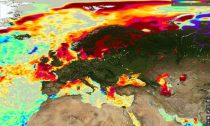
Sizzling temperatures in northern Europe will likely see more people flock to enjoy a dip in the warmer-than-normal water in the coming days.
But, while on the face of it this sounds like a positive development, do higher sea temperatures come at a cost?
Yes, according to Hans-Martin Füssel, a climate change expert from the European Environment Agency (EEA).
He told Euronews that warmer waters in Europe had been linked to more water-borne disease and a worsening of so-called sea dead zones, where increased temperatures mean there is less oxygen for marine life to survive on.
“But the most worrying effects of sea temperature rises are in the tropical and subtropical zones,” said Dr Füssel. “In particular coral reefs, the long-term perspective for them is extremely bad.
“During the 2016 and 2017 marine heatwaves in Australia, for instance, half of the Great Barrier Reef died,” he added. “We run the very large risk of losing most of the world’s coral reefs this century.”
How much have sea temperatures risen?
Some of Europe’s seas have never been warmer as in recent years, according to latest figures from EEA.
The Mediterranean and the North Sea hit record high temperatures in 2014, the latest year for which figures are available. They have never been warmer since systematic temperature measurements started around 1870.
Other regional seas in Europe have also reached record or near-record temperatures in recent years.
The images below show how Europe’s sea temperatures have differed from the long-term average since 2014.
Shades of orange, red and pink indicate warmer-than-average waters. with blue and purple highlighting the opposite.
But they only show a snapshot in time: the sea surface temperatures in July of each of the last five years.
What is causing temperatures to rise?
“The main driver, undoubtedly, are the emission of greenhouse gases, the leading one being carbon dioxide, released when fossil fuels are burned and a number of other gases, like methane and nitrogen oxide ” said Dr Füssel.
“Most human activities contribute to some degree to global climate change – that’s energy consumption and production, transport and agriculture, in particular meat production.”
What impact is rising sea temperatures having?
Higher temperatures are having a devastating impact on coral reefs in tropical areas but closer to home in Europe the effects are also significant.
Fish migration: We have seen large-scale migration of fish and marine life northwards as temperatures have shifted, which has meant subtropical species increasingly seen in European waters.
Catches of cold water fish, like cod and haddock, have halved in some parts of Europe since the 1980s, while fish favouring warmer water, such as red mullet and hake, have increased by 250%, according to the EEA.
“If people depend on local fish they will notice a change there but there’s obviously a lot of international trade with fish so that will balance these effects,” Füssel said.
“It’s more the producers, fishermen and the local communities who experience the changes and not necessarily the consumers.”












Social Profiles